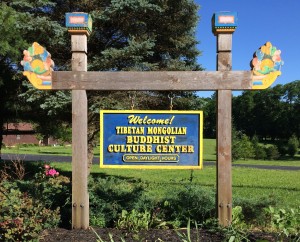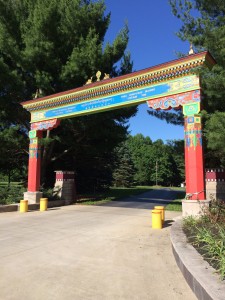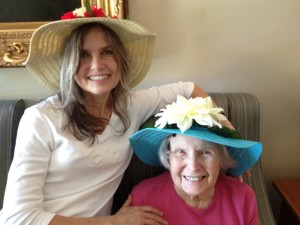Lessons Learned at a Memory Bridge Retreat at the Tibetan Mongolian Buddhist Cultural Center
The following story begins with carefully selected strangers who ultimately become deeply connected by the Memory Bridge experience. Not only were bridges built toward dementia awareness, a small army of networking, luminous warriors was also formed and commissioned to change the way we listen and respond in our care of people with dementia.
Lessons Learned from a Memory Bridge Retreat at a Tibetan Mongolian Buddhist Center
We began our earliest connections at the airport. My first encounter was with Mary. We recognized each other as Memory Bridge travelers, and began to connect. When the elusive shuttle bus arrived, others trickled out of the airport building and got on board. In all, we had five expectant sojourners making our way to the next check point – The Holiday Inn in Bloomington, Indiana. Some dozed and some looked out the window, while I listened in on a joint phone conversation with 1300 other listeners hosted by USAgainstAlzheimers. I reported what I learned from the call once we piled into the van that would take us to our destination.
Upon arrival, as more people gathered, we were shown our accommodations. Twelve of us were taken upstairs and given our assigned rooms. It was up to us to choose which bed to sleep on. My two roommates and I stood looking at the possibilities. Kathleen took the twin bed in the left corner immediately, leaving Bethany and me standing between a twin and full sized bed. With some hesitation followed by each giving the other the option to choose first, I decided on the other twin. We began our unpacking and exploration of how to share this intimate space.
Soon it was time to join the “circle” downstairs, which would be our place of learning, a place of being heard and hopefully, a place of being seen. Labeled “a place of deepening awareness,” Michael Verde’s Memory Bridge structure unfolded over the next four days. We kept to our schedule, which allowed enough space for all to participate. However, between the travel weariness, anticipation and overwhelming feeling of “how did I manage to get here with all these great people”, we must have looked somewhat haggard, since our sensitive leader took notice and began to work in more breaks in the schedule for rest and assignments.
We were given the opportunity to begin each morning with a walk down to the temple to practice morning meditation. I likened this to Matthew 6:6. The Message version of the Bible says, “Here’s what I want you to do: Find a quiet, secluded place so you won’t be tempted to role-play before God. Just be there as simply and honestly as you can manage. The focus will shift from you to God, and you will begin to sense his grace.” I confess that I am a Christian and although well aware of that teaching, I more often than not, choose to “hit the ground running” on many days, and leave my talk with God to be on the go. However, as to receive all this retreat offered and to follow the schedule provided, and even risk offending God, I made my way to the temple. Led by a Tibetan Monk who spoke broken English, aside from listening to the opening prayer that we followed along in a prayer book, and a few breathing exercises, we sat in the lotus position, eyes closed, in silence for forty-five minutes. Once I got over the realization that he said 45 minutes and not four to five, I accepted the challenge even though I felt the need to move and stretch on occasion in order to endure. I wondered if the monk would correct me or if I was being offensive. I later realized I wasn’t in his mind at all as he had cleared his thoughts – no judgment on the way to Nirvana. Each day got easier and on the last day, I got the revelation that I was willing to do this ritual to please my host but not willing at home to do it to please God. – Lesson number one – take time to meditate in the morning, be still, and know God.
The time spent in our Memory Bridge circle produced many ah ha moments. You could see the light bulbs going off as we related our own struggles and experiences. Michael reminded us to “know less and become aware of more” several times. I kept thinking about that as I went through the day. Interacting with our buddies at Autumn Hills Alzheimer Special Care Center provided opportunity to unpack that challenge and we would return to the circle to investigate our findings. Our charge of “letting go, letting in, and letting be” became apparent in the many stories shared as we built bridges with our buddies and amongst ourselves. Since my return to the Alzheimer wing where my mother lives, I have been interacting with the various residents and staff on a deeper level – listening longer, drawing out meaningful interactions, and being less guarded, yet not apologetic or reluctant by my intentionality.
Within the circle, the underlying theme amongst our most intimate confessions was the feeling of not belonging. So here we were, in the land of misfit toys, sharing our journeys in spite of that longing. We found kinship and acceptance, followed by smiles, tears, clapping, and hugs. However, I most related to Michael’s “Listening Deeply in a Flat World” – a thought-provoking hypothesis of restructuring our social framework. Several quotes used resonated with my lot. Particularly, William James’ “No more fiendish punishment could be devised, were such a thing physically possible, than that one should be turned loose in society and remain absolutely unnoticed by all of the members thereof.” His pointing out that we live in a vertical (pyramidal) social order of “who we are is where we are” caused us to realize we’d probably sized our status up already within our circle and then we were charged to measure what it would be like without that structure. We considered what it must be like to have AD and the exile that ensues. My self-imposed status of nursing home resident with Alzheimer disease has been like joining a leper colony. We have our own community, removed and distinct from where we once lived. Michael referred to this status as “the living dead.” He put his finger on what I’ve been feeling for so long. I have felt removed, isolated, and lonely while caring of my mother.I found that my personal challenge is to stop grasping to convince myself that I am here and that I matter. I wondered if needing to matter is what motivates most of what I write about. Lesson number two –Empathetic listening helps us realize how much alike we really are. Lesson number three – I don’t have to prove myself to feel good about the care I provide for my mother.
My first night with my roommates was very quiet as I managed to get in there after they were asleep and the lights were out. I was grateful for my phone light and for the headlamp I had brought along. I was able to change in the dark for bed and once in bed, write in my journal, wearing the light strapped to my forehead. Thankfully, I didn’t wake anyone. The next night, I was in the light, interacting with my roomies. It didn’t take long to discover that the woman in the next bed had the knack of listening to me in such a way that all the stories I shared about “living in a nursing home” drew peals of uncontrollable infectious laughter. That just fueled the fire, and I found great healing by having this delightful nymph not only listening, relating, and validating but seeing me in a humorous way. The dry desert of my exile into the “land of living dead” began to flow with living water. Up to this point, my source of living water has been the Holy Spirit, who fills and renews me as I pour out to others. However, Jesus knew what he was talking about when he said, “This is my commandment, that you love one another, that your joy may be full”. I remembered as I grew up with my father, mother, and older sister, I was the one who made everyone laugh. I’d forgotten about that little girl and wondered where she is. We stayed up late at the expense of our sleeping roommate who later assured me that she enjoyed going to sleep to sounds of giggling and waking to the sounds of giggling.
Word got around, and with the mention of chocolate, that double bed became the after hours communal circle. What didn’t get said during the day was given the opportunity to be said that night. More confessions were spoken, surprising even us at our ready transparency. Equated with a college dorm experience, we held on to the magic moments until the wee hours of the night. By the fourth night, although the licorice supply was almost depleted and the chocolate was long gone, we added music and the pictures came out to show off our families, pets, and hairstyles. We knew our time was fleeting and this was too precious to pass up – an opportunity to have girlfriends to confide in. The big bed lent itself to comfort, closeness and coziness. However, I remained upon my solitary bed looking over at this cuddly group. Since there was limited floor space in our room, during the day, I kept my suitcase upon my bed. Maybe it stood as a barrier to invitation. My sweet, welcoming roommate was having the same effect on our visitors that she had on me. She later remarked that they were “piled up like puppies,” as the women enjoyed the closeness. I noticed as the pictures began to post in Facebook, that Bethany had this effect with others throughout the retreat. In fact, she was the one who brought our awareness that “vulnerability is the birthplace of love.” I was aware of her inclusive ways and intentional interaction with me and appreciated her awareness to my somewhat guarded singular persona. I remember hearing myself quote Maya Angelou’s truth that “people don’t remember what you said or what you did, but they remember how you made them feel”. I appreciate the people who took me aside and gave me encouraging, validating words. My surprise at their kindness made me feel like I’d found that funny little girl who just wanted to help people feel better. Lesson number four – be more aware of how I make people feel. Lesson number five – vulnerability is the birthplace of love.
These two strong lessons are important for all our relationships. I considered my husband and how I must make him feel. I considered the faces of people I interact with in the nursing home, especially the staff. Do I still come across as someone who doesn’t need help? Oh contraire. I remembered that my sister has stepped up to help when I become vulnerable, rather than the person in charge. The goal of Memory Bridge is “the ability to attend more fully”. I believe I am moving toward that. I embrace care giving as a spiritual practice. At the retreat, I had made the trip into the darkness of my past and the loneliness of not being seen with my fellow seekers, but I don’t live there much of the time. Not only do my visits to the nursing home bring others pleasure, but I thrive on the friendships and interactions I have. I have learned to “stand in a place that we would rather not” as Jane quoted. Pauline quietly shared profound, meaningful thoughts that enforced my belief that “each person is an expert at any given time on what they need” and “that I was attempting to empower the person who is living their life.” I loved what one of the buddies said, ”The only place for a person to really be is with another person.” My most meaningful revelation is in Matthew 25:40 which says “And the King will answer them, ‘Truly, I say to you, as you did it to one of the least of these my brothers, you did it to me” ESV. In my service to the “land of the living dead” I am serving Christ. For me, it doesn’t get any better than that.
When the retreat was over, we took the reverse order of travel, making our way home as different people. We chatted continuously with our friends on the bus, took photos and promised to remain connected. One by one, we parted until there were four of us “girls” going through security. We became playful after the security officer offered to call my friend over the loud speaker while I waited for her to get through. That brought more shrieks of laughter and photo opportunities, as we were all awarded junior officer status with sticker badges. We raced in the hallways of the airport against the moving sidewalk and had a final meal together. Our time was almost up and we lingered as long as we could. My final farewell was to my roommate, Kathleen, as the doors to the concourse closed behind me and I watched her move out of sight. Now we are left with our memories and introspection. What we do with an increased awareness of empathy in listening is wide open. I remembered that our last activity together to close our circle was led by our therapeutic clown. She had us shake our bodies all over and move in close, reach across until we could touch fingers, then lift our hands and throw our energy up into the air with a loud shout. All that we had learned was released and made available into the universe. We are like the lightening bugs that sparkled after dusk when we came out of from our evening meditation – lighthouses that give direction and safety to those with dementia.
I don’t want to ever lose what I felt with the delightful company created at Memory Bridge. I am grateful for Michael’s passion for the pursuit of empathetic listening and bridge building. His ability to put into words what I’ve been trying to express is a relief to me. Hearing his voice and seeing what he inspires, I am hopeful for the many affected with Alzheimer’s disease. Especially knowing the people at the retreat who are on the same page. I say, go Michael, go Memory Bridge, and go people of purpose who attended the retreat. And go to the many who will be inspired as a result.
How have these lessons changed me? On my way out of the Wal-Mart parking lot today, I approached an intersection where a man was sitting in the grass, holding a handwritten sign. I noticed his ruddy face and tobacco stained moustache. I thought, in my usual way, that he might do better by working than sitting in the sun all day looking for a handout. Then I noticed the Vietnam hat he wore. I immediately thought of my buddy back in Bloomington who proudly wore his WWII hat whenever he left his room. I realized that this man held his identity in that hat and hoped to be seen as somebody who once belonged and mattered. I fished out a five-dollar bill and rolled down the window. I confess this is the first time I have responded in this manner to someone on the side of the road holding a sign. He thanked me for whatever I was about to give him. Then he said, “Do you have a family member in the service?” I said, “Yes, my father served in WWII.” “Is he still living?” he asked. “No” I replied. He reported the latest statistic that every 90 seconds a WWII vet dies in this country. He looked at the bill in his hand and said that it would help a lot. I held his gaze and saw him. And for a moment, he saw me.





Recent Comments